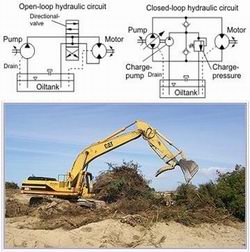
- Training Courses
- Hydraulics Courses
Training Courses
Hydraulics Courses
5 different training courses in Hydraulics Automatic Control Systems
| Code | Course Title |
|---|---|
| Hydr-1 | Basics and Components of Industrial Hydraulic Control Systems (an Interactive computer-based training course) |
| Hydr-2 | Design, Analysis and Investigation of Industrial Hydraulic Control Systems |
| Hydr-3 | Practical applications and Examples of Hydraulic Control Circuits |
| Hydr-4 | Advanced Analysis and Applications of Hydraulic Control Circuits |
| Hydr-5 | More Applications of Industrial Hydraulic Control Systems |
What is a Hydraulic system? What is it used for?
 It is a system that uses special hydraulic oils to power and control something. A hydraulic drive system is a drive or transmission system that uses pressurized hydraulic fluid to drive hydraulic machinery. The term hydrostatic refers to the transfer of energy from flow and pressure, not from the kinetic energy of the flow.
It is a system that uses special hydraulic oils to power and control something. A hydraulic drive system is a drive or transmission system that uses pressurized hydraulic fluid to drive hydraulic machinery. The term hydrostatic refers to the transfer of energy from flow and pressure, not from the kinetic energy of the flow.
A hydraulic drive system consists of three parts: The generator (e.g. a hydraulic pump), driven by an electric motor, a combustion engine or a windmill; valves, filters, piping etc. (to guide and control the system); the motor (e.g. a hydraulic motor or hydraulic cylinder) to drive the machinery and get the output motion.
Examples for Hydraulic systems are clamp and drill circuit and hydraulic cylinders used on excavators.
ILOs of courses for Hydraulics Automatic control Systems & their Applications:
1- Knowledge and Understanding:
- Understand and apply knowledge of basic physics laws and fluid mechanics concepts as they apply to Hydraulic power and to solution of automatic control problems using Hydraulic systems.
- Understand and apply knowledge of thermo-fluid characteristics of hydraulic oils and various types of fluids conducting methods and the proper materials used for each one.
- Understand and apply knowledge of Principles of Hydraulic System design including types of pumps, hydraulic actuators, various control valves and accessory components in a typical hydraulic system and process control design.
- Understand reading hydraulic schematics and identify system components & design function as well.
- Understand and apply knowledge of Maintenance & Troubleshooting of Hydraulic Control Systems.
- Understand current engineering technologies related to Hydraulic Automatic Control Systems.
2- Intellectual Skills: This course helps the students to acquire the ability to:
- Identify, select, describe, and draw the main various components in typical Hydraulic schematics and to recognize and comprehend how these components function and interact with each other.
- Follow and participate in a comprehensive interactive &computer-based virtual and multi-media training labs which include system animations, 3-D models and on-line multiple choices quizzes.
- Identify, formulate and solve main basic automatic control problems using Hydraulic power.
- Design Hydraulic circuit, component & schematics to meet required needs within realistic constraints.
- Select appropriate components for modeling and analyzing typical Hydraulic Control problems.
- Select appropriate solutions for various multiple choices quiz problems based on analytical thinking.
- Assess and evaluate the characteristics and performance of pumps, hydraulic actuators, various control valves and accessory components in a typical hydraulic system and process control design.
- Use virtual lab tools & software packages pertaining to hydraulic systems & process control design.
3- Practical and Professional Skills: This course helps the students to acquire the ability to:
- Integrate knowledge of basic physics laws, fluid mechanics concepts, information technology, design, and engineering practice to solve engineering problems of Hydraulic Control Systems.
- Employ drawing & professional skills to design & analyse schematics of hydraulic systems & process control circuits.
- Use a wide range of computer applications, technical tools, and techniques including pertinent virtual labs software.
- Implement comprehensive knowledge, understanding, and intellectual skills in solving on-line virtual training labs, exercises, and MCQ problems.
- Prepare and present technical reports and schematics of hydraulic circuits and control systems.
4- General and Transferable Skills: This course helps the students to acquire the ability to:
- Collaborate & Communicate effectively within a lab group/team.
- Work in stressful class and lab environment and within time constraints.
- Demonstrate efficient IT capabilities.
- Manage tasks and lab resources efficiently.
- Search for information and adopt self learning.
- Refer to relevant literature effectively.
All Rights Reserved.
